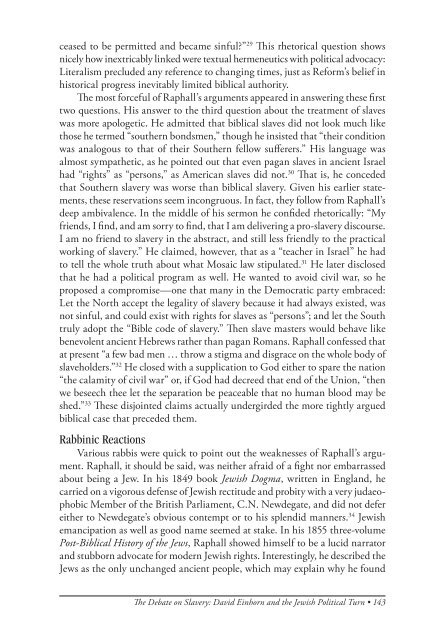American Jewish Archives Journal, Volume 64, Numbers 1 & 2
American Jewish Archives Journal, Volume 64, Numbers 1 & 2
American Jewish Archives Journal, Volume 64, Numbers 1 & 2
Create successful ePaper yourself
Turn your PDF publications into a flip-book with our unique Google optimized e-Paper software.
ceased to be permitted and became sinful?” 29 This rhetorical question shows<br />
nicely how inextricably linked were textual hermeneutics with political advocacy:<br />
Literalism precluded any reference to changing times, just as Reform’s belief in<br />
historical progress inevitably limited biblical authority.<br />
The most forceful of Raphall’s arguments appeared in answering these first<br />
two questions. His answer to the third question about the treatment of slaves<br />
was more apologetic. He admitted that biblical slaves did not look much like<br />
those he termed “southern bondsmen,” though he insisted that “their condition<br />
was analogous to that of their Southern fellow sufferers.” His language was<br />
almost sympathetic, as he pointed out that even pagan slaves in ancient Israel<br />
had “rights” as “persons,” as <strong>American</strong> slaves did not. 30 That is, he conceded<br />
that Southern slavery was worse than biblical slavery. Given his earlier statements,<br />
these reservations seem incongruous. In fact, they follow from Raphall’s<br />
deep ambivalence. In the middle of his sermon he confided rhetorically: “My<br />
friends, I find, and am sorry to find, that I am delivering a pro-slavery discourse.<br />
I am no friend to slavery in the abstract, and still less friendly to the practical<br />
working of slavery.” He claimed, however, that as a “teacher in Israel” he had<br />
to tell the whole truth about what Mosaic law stipulated. 31 He later disclosed<br />
that he had a political program as well. He wanted to avoid civil war, so he<br />
proposed a compromise—one that many in the Democratic party embraced:<br />
Let the North accept the legality of slavery because it had always existed, was<br />
not sinful, and could exist with rights for slaves as “persons”; and let the South<br />
truly adopt the “Bible code of slavery.” Then slave masters would behave like<br />
benevolent ancient Hebrews rather than pagan Romans. Raphall confessed that<br />
at present “a few bad men … throw a stigma and disgrace on the whole body of<br />
slaveholders.” 32 He closed with a supplication to God either to spare the nation<br />
“the calamity of civil war” or, if God had decreed that end of the Union, “then<br />
we beseech thee let the separation be peaceable that no human blood may be<br />
shed.” 33 These disjointed claims actually undergirded the more tightly argued<br />
biblical case that preceded them.<br />
Rabbinic Reactions<br />
Various rabbis were quick to point out the weaknesses of Raphall’s argument.<br />
Raphall, it should be said, was neither afraid of a fight nor embarrassed<br />
about being a Jew. In his 1849 book <strong>Jewish</strong> Dogma, written in England, he<br />
carried on a vigorous defense of <strong>Jewish</strong> rectitude and probity with a very judaeophobic<br />
Member of the British Parliament, C.N. Newdegate, and did not defer<br />
either to Newdegate’s obvious contempt or to his splendid manners. 34 <strong>Jewish</strong><br />
emancipation as well as good name seemed at stake. In his 1855 three-volume<br />
Post-Biblical History of the Jews, Raphall showed himself to be a lucid narrator<br />
and stubborn advocate for modern <strong>Jewish</strong> rights. Interestingly, he described the<br />
Jews as the only unchanged ancient people, which may explain why he found<br />
The Debate on Slavery: David Einhorn and the <strong>Jewish</strong> Political Turn • 143
















